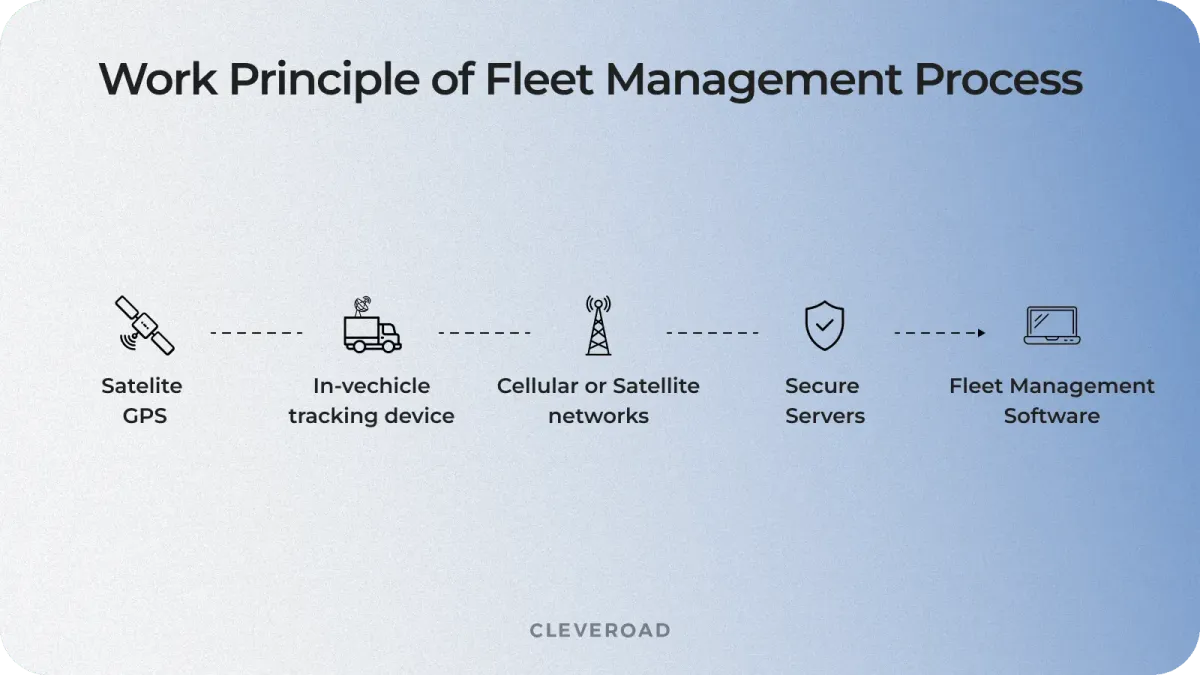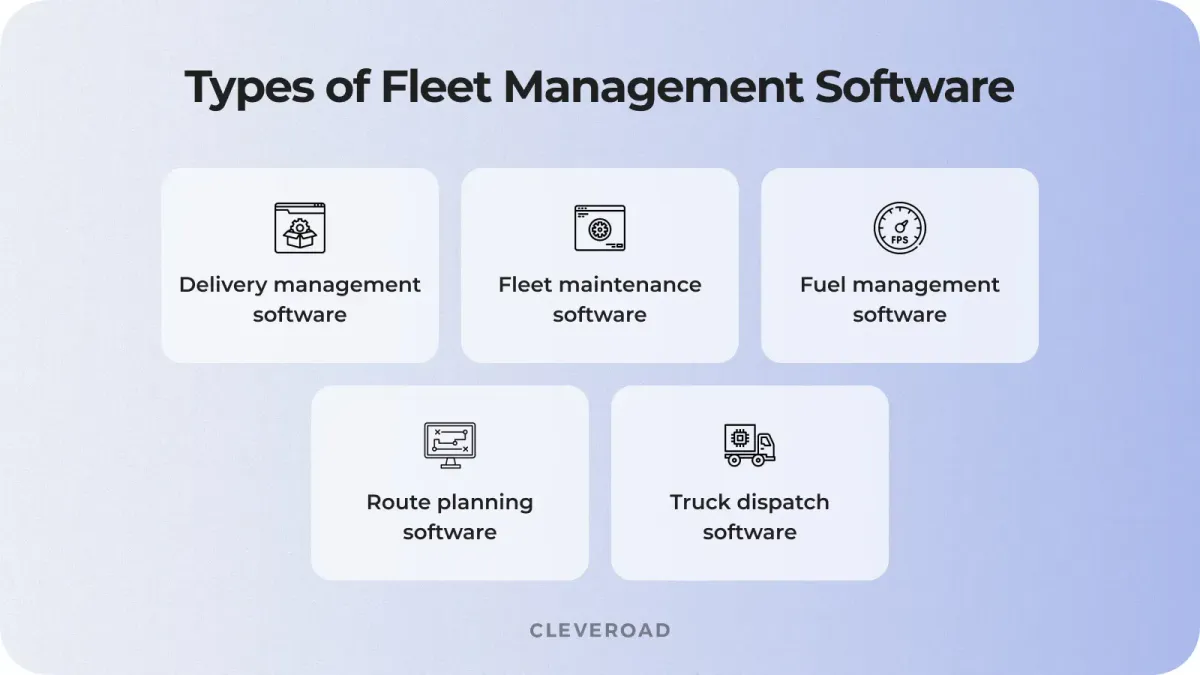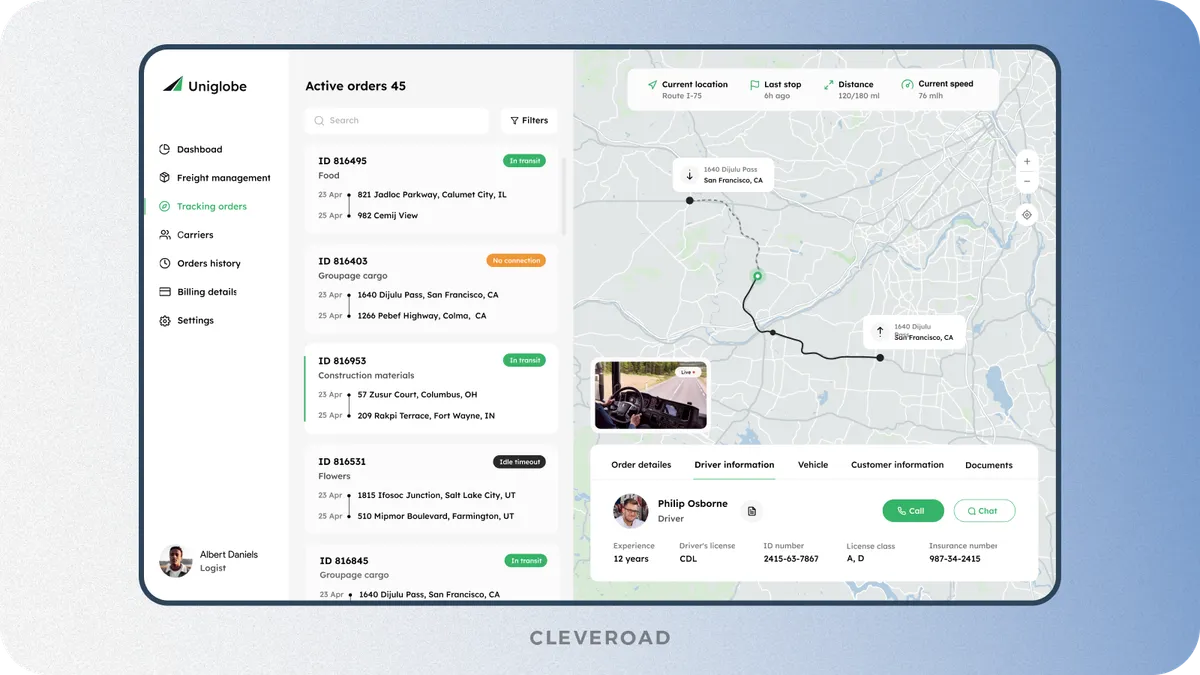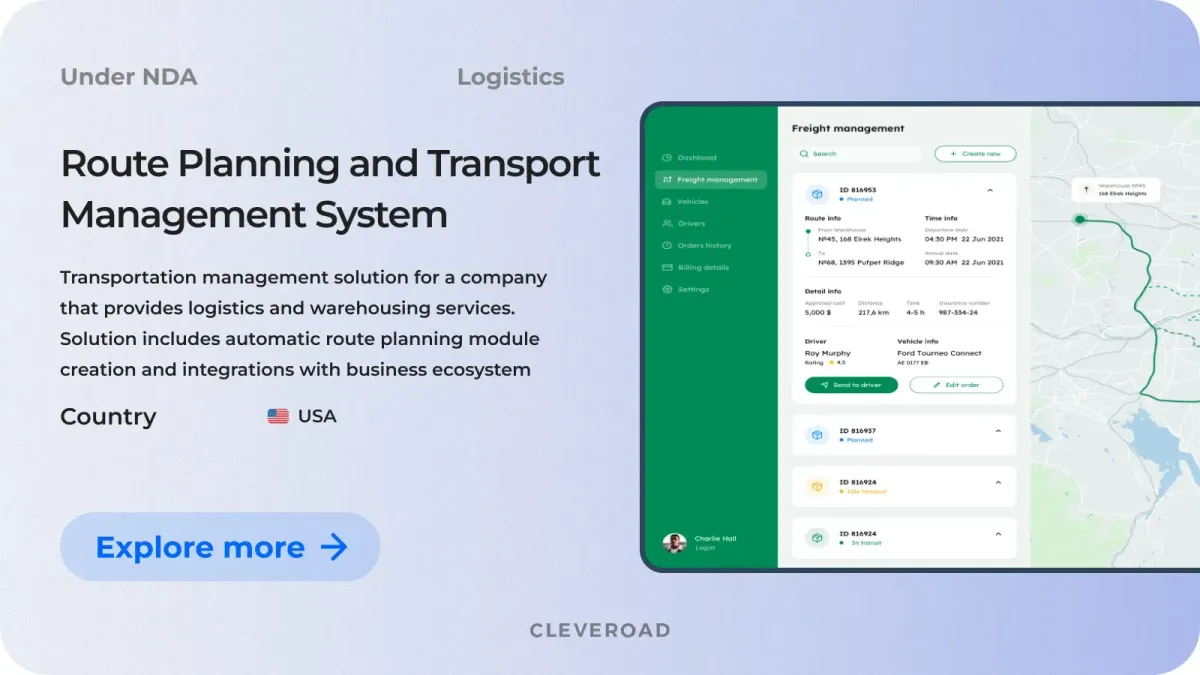Fleet Management Software Development: Features, Essentials, and Technology
Updated 14 Nov 2025
19 Min
2364 Views
Fleet management software development is a great solution for freight and transportation companies to reduce fuel consumption, cut down the time spent idling in traffic, and increase drivers' productivity. Modern fleet systems open up a wide range of business benefits by connecting vehicles, drivers, and dispatchers into one intelligent ecosystem.
At Cleveroad, we’ve spent over 15 years building logistics and transportation solutions that help companies streamline fleet operations and achieve higher delivery efficiency. Our expertise includes developing custom telematics, tracking systems, building integrated dashboards for real-time fleet analytics, and more. Drawing on this experience, we created this practical guide to fleet management software development, where you’ll learn:
- What fleet management software is and how it works
- Key types of fleet management systems
- Must-have features and integrations for logistics businesses
- Technology stack and architecture essentials
- Steps to develop custom fleet management software
- Common challenges and how to avoid them
What Is Fleet Management Software
Let’s discuss what fleet management software is all about and how logistics companies can benefit from fleet management automation.
Fleet management software, or FMS, is a self-powered app or cloud product that helps businesses track and manage vehicles and technicians from a central platform. Consider it as a centralized dashboard that fleet managers can use to track tons of vehicle data: speed, temperature, fuel level, door opening, geographical location, route direction, and so on. The fleet management process implies communication between devices and software, which is a pretty complicated sector of the network.
After installing a device on the vehicles, the logistics management system software collects information from them using such integral elements as the GPS technology and sensors. This data is displayed on the manager screen, which allows users to monitor all their vehicles in real-time, figure out when they get to the destination, and how well the drivers manage them and behave on the road.

How fleet management works
Core benefits of fleet management system development
Fleet management application development addresses many logistical challenges. If you’re thinking about investing in a fleet management solution, here are 6 main benefits this system will bring to your operations:
- Cost savings
Fleet management software helps reduce operational costs by providing actionable insights into fleet health, maintenance schedules, and fuel consumption. Detailed reports show the real cost of each vehicle, helping managers make smart decisions about repairs, routes, or replacements.
- Optimized fuel consumption
Fuel is one of the biggest cost drivers in logistics. A fleet management system tracks idling, route inefficiencies, and driving behavior to highlight wasteful patterns. With this data, managers can adjust routes or train drivers to reduce fuel expenses.
- Better customer satisfaction
Delays and poor delivery performance often lead to customer churn. Fleet management tools improve route accuracy, provide real-time ETAs, and enable on-time deliveries. This boosts reliability and strengthens client trust.
- Improved driver performance
Driver analytics dashboards help managers monitor routes, speed, and driving behavior. This data enables performance reviews, safe-driving incentives, and more efficient route planning that minimizes fatigue and accidents.
- Fraud prevention
A fleet management solution can also prevent driver-related fraud. AI-powered systems detect unusual fuel card usage or mileage inconsistencies and alert managers in real time, ensuring accountability and transparency.
- Preventive maintenance
Predictive analytics allow businesses to identify vehicle issues before they lead to breakdowns. The software uses usage data, such as mileage, load, and road conditions, to schedule timely maintenance and extend fleet lifespan.
Fleet management market overview
Fleet management is a critical function for industries like logistics, freight, field services, and transportation, all of which rely on real-time visibility, cost control, and regulatory compliance to stay competitive. The demand for fleet tracking and vehicle optimization tools continues to grow, as businesses seek more intelligent ways to manage operations and reduce downtime.
Here’s what the market looks like today:
- The global fleet management software market is expected to reach $55–58 billion by 2028, with longer-range estimates suggesting it could exceed $97 billion by 2031 (Source: M&M)
- GlobalNewsWire reported that the transportation & logistics sector is the largest adopter of fleet management software solutions, accounting for roughly 42.8% of the end-use market by revenue
- Fleet telematics (GPS tracking and IoT devices) has high adoption, with about 83% of fleet operators using telematics systems in their vehicles, according to recent surveys (Source: FleetNerd)
- According to Teletrac, integration of advanced tech is rising. Roughly 47% of fleet operators are actively using AI tools in their tech stack for automation and decision support
Opt for our freight management system development services to give your shippers and carriers better capacity opportunities
Types of Fleet Management Software
There are different types of fleet management software. We have listed the main ones below for your reference. However, you do not have to opt for any particular type in its pure form. You can always combine them into one app to maximally benefit from product. To choose a relevant type, contact our Logistics tech specialists with your business challenge and we will tell you which type can help you.
Delivery management
This type of software allows delivery businesses to manage fleets and to automate dispatching operations. Managers can assign tasks to delivery agents based on their schedules and monitor the live location of on-field staff using geofencing technology.
Fleet maintenance
Maintenance fleet tracking software development aims at fleet inventory tracking, preventive maintenance, repair logs, order management, and reporting. Users can make custom schedules and work orders based on repair requests or preventive maintenance schedules.
Fuel management
This type of fleet management system development helps businesses optimize processes related to fuel monitoring, vehicles, and more. Managers can keep fuel receipts, vehicles' maintenance history, and drivers' personal information in a centralized repository and monitor fuel consumption.
Route planning
Its main valuable features include route planning and routing guides. Route optimization app lets fleet managers enter or upload customer addresses and plan custom routes for cost-efficiency. Managers can also monitor driver progress on routes in real-time and manually adjust them.
Truck dispatch
Trucking dispatch software is designed for freight brokerage companies. Its features include dispatch and scheduling, GPS fleet tracking, freight brokerage, and rates and quote management. Moreover, freight management system development services allow transportation companies to improve cargo planning and simplify the RFP process with carriers.

Types of fleet software
Essential Fleet Management Software Features
A fleet management system can have a variety of features depending on business-specific tasks. FMS development allows you to pick a set of unique features that align with your specific business need. Let’s explore the most critical functionality for the fleet management app development.
GPS tracking
GPS tracking is a foundational feature of fleet management software development. It enables businesses to monitor the real-time location of their vehicles using Global Positioning System (GPS) technology. With GPS tracking, fleet managers can track vehicles' movements, optimize routes, and ensure timely deliveries or service calls. This feature enhances operational efficiency, improves customer satisfaction, and enables better decision-making based on accurate location data.
Driver management
Effective driver management is critical for ensuring fleet safety, compliance, and productivity. Fleet management app development should also focus on providing comprehensive driver management features that enable businesses to monitor driver performance, track driving behavior, and ensure compliance with regulatory requirements such as hours of service (HOS) regulations. This feature helps companies to identify high-performing drivers, address safety concerns, and optimize workforce management actions and strategies.
Fuel monitoring
Fuel monitoring capabilities allow businesses to track fuel consumption and analyze fuel usage patterns across their fleet. Fleet management software collects data on fuel consumption, mileage, and vehicle performance to provide insights into fuel efficiency and identify cost-saving opportunities. By monitoring fuel usage in real-time, businesses can detect inefficiencies, reduce fuel costs, and improve overall fleet sustainability and payback.
Route planning
Route planning functionality is essential for optimizing fleet operations and reducing transportation costs. Fleet management software systems include advanced route planning software tools that analyze traffic conditions, vehicle capabilities, delivery schedules, and customer locations to create the most efficient routes. By optimizing routes, businesses can minimize fuel consumption, reduce travel time, simplify fleet management, and improve fleet productivity and efficiency.
Fleet maintenance
Fleet maintenance features help businesses optimize vehicle maintenance schedules, reduce downtime, and extend the lifespan of fleet assets. Fleet management software includes maintenance scheduling tools that track vehicle maintenance tasks, schedule service appointments, and manage maintenance records. By proactively managing fleet maintenance, businesses can prevent breakdowns, minimize repair costs, and ensure fleet vehicles remain in optimal condition.
Analytics and reporting
Analytics and reporting tools provide valuable insights into fleet performance, operational efficiency, and driver behavior. Fleet management software collects data on key performance indicators (KPIs) such as fuel consumption, vehicle utilization, driver productivity, and maintenance costs. Advanced analytics capabilities analyze this data to identify trends, patterns, and areas for improvement. Customizable reports and dashboards enable fleet managers to make data-driven decisions, optimize fleet operations, and achieve business objectives.
ELD compliance
Electronic Logging Device (ELD) compliance features ensure businesses adhere to regulatory requirements for recording driver hours of service. Consider including ELD functionality during fleet management application development to automate the logging and reporting of driver hours, rest breaks, and duty status changes. By ensuring ELD compliance, businesses mitigate compliance risks, avoid penalties, and maintain regulatory compliance with laws such as the Federal Motor Carrier Safety Administration (FMCSA) regulations.
Custom integrations and APIs
Flexible customization options and robust application programming interfaces (APIs) enable seamless integration with existing systems, third-party software, and IoT devices. Fleet management system development offers custom integration capabilities that allow businesses to connect their fleet management systems with other business-critical applications such as Enterprise Resource Planning (ERP) systems, Customer Relationship Management (CRM) software, and telematics devices. By integrating fleet management software with other systems, businesses can streamline workflows, improve data accuracy, and achieve greater operational efficiency.
Fleet Management Software Development Steps
There are two approaches to fleet management app development: out-of-the-box software or custom software. A ready-made solution is a good choice if you’re limited on budget and want to integrate the software into the business processes as quickly as possible. In turn, custom fleet management software provides flexibility in terms of features, design, and logic, and gives you a competitive advantage.
To build fleet management software from scratch, you should think through the following points:
Step 1. Define your requirements
First, define your product’s requirements and business goals: the type of fleet software you need and the challenges you want to solve. For example, you want to create a fuel management app to reduce fuel costs. Or you need driver management software to enhance drivers’ skills, minimize vehicle damage, and reduce repair and idle-time costs. To efficiently gather requirements, we highly recommend that you contact fleet management service providers. The team of qualified specialists will research the current pain points and demands of your business to offer the most relevant solutions.
Step 2. Find relible software vendor
Custom FMS development can be a resource and time-consuming process, so it’s better to hire a dedicated development team with confirmed expertise in building fleet management solutions.
Although you can consider freelancers and in-house teams for hiring, for fleet management, they are not the most optimal. To streamline the fleet management software development flow and get the maximum quality at reasonable costs, consider the following three cooperation models:
- Get a dedicated software development team. This cooperation model refers to getting an entire team of software development professionals from a service vendor in the long term.
- Staff augmentation. Staff augmentation services imply the provision of software engineers to fill the expertise needed for short-term job positions within your project.
Remote Team: How to Hire
Practical guide to hiring and managing a high-performing remote team

Step 3. Solution design stage
Solution design stage implies that you and your IT vendor define the business context, the main product’s goals, and finally schedule a meeting with your future design team. During the meeting, the team defines the following fleet management app development aspects:
- Potential risks and concerns
- Business goals
- A work scope
- Quality attributes
Step 4. Discovery phase
Discovery phase services are aimed at turning your product’s requirements into a clear specification plan. This stage enables speeding up the software development process and increases the final quality level. So, to finally form a clear development strategy, the team needs to organize earlier collected aspects like desired functionality, relevant feature set, etc.
The project team also defines the possibility of including particular features, developing the visual concepts, conducting extensive business analysis, and getting a detailed fleet software cost estimate.
Step 5. Development and/or integration
During the development phase, fleet management software is designed and created according to approved requirements, involving coding, testing, and deployment. Depending on your needs, you can either develop the fleet management software as a standalone solution or integrate it into your existing logistics management business environment.
When it comes to standalone fleet management software development, starting with a Minimum Viable Product (MVP) allows for the quick deployment of essential features tailored to fleet management needs. This initial version provides a foundation for gathering feedback from users and stakeholders, guiding further iterations.
Similarly, in scenarios requiring integration into existing systems, a Proof of Concept (POC) is indispensable. By creating a POC, developers can assess the compatibility and performance of the fleet management module within the broader logistics ecosystem. This process ensures that the integrated solution seamlessly interacts with other components, optimizing efficiency in fleet operations.
We explained the main differences between POC vs prototype vs MVP. Check our article to learn more
Regardless of the approach, the primary goal remains delivering a functional fleet solution quickly to prove its value and mitigate risks. Following development, QA engineers conduct thorough testing to ensure the vehicle tracking software is bug-free, and a product demo is prepared for testing. If successful, the software is released into your business environment.
Step 6. Deployment
Here, the principle is quite the same: if you’ve delivered an MVP version, you can launch the MVP on target markets to test the whole concept of your project, determine if a software solution is user-friendly, identify weak sides, and continue development, making improvement decisions based on users’ requirements. For this, the team of tech experts, a Project Manager, and Business Analysts helps assemble and analyze the feedback effectively. Besides, they conduct focus group interviews efficiently.
In the case of an integrated solution, your team has to deploy fleet software in a live product environment. This must be done to monitor and ensure that the implementation process ends successfully. Then your team also has to arrange UAT (User Acceptance Testing). This will allow you to test software by its intended audience in real-world conditions.
Step 7. Maintenance
The development process doesn’t stop after the fleet management software is built. If you want your product to run for years, you should consider its maintenance.
Usually, project maintenance includes:
- Performance improvements
- Code optimization
- Adding new features
- Supporting the latest versions of third-party services
Please keep in mind that even though custom logistics software development requires extra time and money, it can save you a lot of money in the long term.
A ready-to-use solution requires the same development stages. The difference is that there is already a set of features necessary for effective fleet management. To achieve the best cost efficiency, you need to compare the app’s functionality with your requirements to define whether the software matches your logistics business goals.
What Devices Are Used in Fleet Management Systems
Fleet management software development involves the integration of various devices to create a comprehensive system for monitoring and managing fleets effectively. Here's a detailed overview of the devices commonly used in fleet management systems:
GPS trackers
GPS trackers are integral to fleet management system development. These devices use Global Positioning System (GPS) technology to accurately track the location of vehicles in real-time. GPS trackers provide precise coordinates, speed, and direction data, allowing fleet managers to monitor vehicle movements efficiently at any moment.
OBD-II devices
On-Board Diagnostics (OBD-II) devices are crucial in fleet management app development. These devices plug into a vehicle's OBD-II port to collect data on engine performance, fuel consumption, vehicle diagnostics, and more. By integrating OBD-II devices, fleet management systems can provide detailed insights into vehicle health and performance.
Telematics systems
Transportation telematics systems combine GPS tracking with onboard sensors to gather comprehensive data on vehicle operations. These devices monitor vehicle speed, acceleration, braking, and engine diagnostics. By leveraging telematics units, fleet management systems can analyze driver behavior, optimize routes, and enhance overall fleet efficiency.
Explore our guide on transportation telematics systems to learn how they can improve your logistics business
Electronic Logging Devices (ELDs)
Electronic Logging Devices (ELDs) are essential for fleet management system development, especially for compliance with regulatory requirements. ELDs electronically record a driver's hours of service (HOS), ensuring adherence to legal mandates. These devices track driving time, rest breaks, and other relevant data to promote driver safety and regulatory compliance.
RFID tags
Radio-frequency identification (RFID) tags are valuable assets in fleet tracking software development. These tags enable the tracking and identification of vehicles, equipment, and cargo items. RFID technology provides real-time visibility into fleet operations and inventory, enhances asset management, and prevents loss.
Sensors
Various sensors, including temperature, pressure, and motion sensors, are employed in vehicle management software development to monitor environmental conditions and detect maintenance issues. These sensors contribute to proactive maintenance scheduling and cargo monitoring.
Potential Challenges in Fleet Management App Development
Transportation companies tend to use FMS solutions to optimize operations and solve many problems, and optimize your fleet day-to-day operations. Let’s consider the core challenges that fleet management software is capable of solving.
Cost management
In fleet operation, the primary challenge you may face is the need to reduce operational fleet costs. Constantly investing in fuel, maintenance, and repair of the vehicles may be much easier by engaging a fleet management system development. Incorporating fleet management software, you can make use of multiple useful tools and detailed analytics, allowing for tracking and analyzing costs and developing effective and reliable cost-saving strategies.
A fleet control software can significantly reduce vehicle operating expenses (OPEX). It can improve everything from driving performance to route optimization, cutting down money that would otherwise be lost due to overall fleet inefficiency. (Source: Proquest)
Vehicle tracking and performance monitoring
Some difficulties may arise while trying to establish real-time visibility of a particular vehicle or a driver's behavior. However, ensuring safety and total compliance with all regulations is vital; otherwise, it may lead to undesirable negative consequences.
That’s why keeping an eye on driver performance will be worth it. With the help of built-in GPS tracking, managers can track speed, vehicle conditions, driving patterns (sharp braking, idling, or cornering), and, thus, boost drivers’ efficiency. For instance, the drivers will get reward points based on their safety measures, delivery times, car maintenance, etc. All this information can be shared with drivers to encourage them to do their work better.
Regulatory compliance
Logistics companies have to adjust to many rules to comply with state, local, and federal laws. Therefore, when planning a successful fleet management software development, you should consider the latest industry standards regarding security, usability, and interoperability, such as:
- GDPR compliance
- Regulation (EC) No 561/2006
- Regulation (EEC) No 3821/85
- Regulation (EC) No 2135/98
- Regulation (EU) No 165/2014
A fleet software management can keep your company up-to-the-minute with the ever-changing regulatory landscape, restricting noncompliance issues that could lead to fines. It provides users with real-time regulation data and alerts users about the changes.
Fuel management
Fuel consumption is a key aspect that can significantly influence your performance and financial investments, and improve customer service. However, you may face unpredictable difficulties as fuel theft and fraud, inaccurate reporting, the way of improper fuel storage, etc.
Fleet tracking software development can offer various solutions to a single problem. Firstly, FMS is capable of providing you with real-time tracking of fuel consumption, and vehicle fleet data can minimize the possibility of fraud by providing you with accurate reports. Besides, FMS can facilitate a smooth transition to more eco-friendly vehicles and fuel types, helping to reduce the carbon footprint.
The Cost to Develop Fleet Management Software
The cost of developing a fleet management system varies depending on several factors. Here are the main aspects that influence the fleet management system development cost:
- Software complexity: A basic MVP with GPS tracking and driver dashboards costs much less than a full-scale fleet management platform with real-time analytics and AI-powered optimization.
- Technology stack: The tools and frameworks used to build your platform (like backend frameworks, cloud providers, databases, etc.) impact overall development time and cost.
- Platform selection: Your choice of platform, such as web, mobile (iOS/Android), or both, and the decision to go native or cross-platform will affect development hours.
- Development team location: Rates vary by region. Hiring Eastern European developers may cost 2–3x less than hiring US-based teams, with no loss in quality if you choose a trusted vendor.
- Team size and structure: Costs depend on whether you need only developers or also a BA, UI/UX designer, DevOps engineer, and project manager.
Based on our experience delivering custom fleet management solutions, we’ve outlined a cost and timeline estimate for different levels of FMS complexity:
| Fleet software type | Estimated cost ($) | Timeframe (m) |
Simple | $7,000–$20,000 | 2–3 months |
Medium complexity | $15,000–$25,000 | 3–6 months |
Advanced/Complex | $20,000–$35,000+ | Up to 9 months |
Please note that this estimate is approximate. Custom software development pricing depends on real business needs. The best way to get an accurate quote is to discuss your fleet size, operating model, and feature roadmap with a trusted partner. Contact us, and we’ll help you estimate your product development costs that will meet your business requirements.
Cleveroad's Fleet Management Development Expertise
Cleveroad is a logistics software development company that has been delivering digital solutions for logistics and transportation businesses since 2011. We have R&D centers in Estonia, Poland, and Ukraine and representative offices in the US and Norway. Our expertise range includes building custom logistics software of various types: Transportation Management Systems, warehouse management system, Freight Rate Management System (FRMS), Enterprise Resource Planning (ERP), fleet control software, Final-Mile Delivery software, and more.
Working with us, you’ll get:
- Full-cycle logistics software development services covering solution design and discovery phases, development, release, and maintenance
- On-demand IT services: software modernization services, UI/UX design, cloud solutions, legacy software modernization, IT consulting, and managed IT services
- Option to sign non-disclosure agreements (NDAs) upon your request to ensure privacy and confidentiality of your business information
- Flexible cooperation models: Staff Augmentation, Dedicated Development Team, and Project-Based
- Consultation with our Logistics subject matter experts as to the development of tailored fleet management solution aligning with your business needs
- Assurance of high-quality logistic products and services through cooperation with an ISO-certified IT provider: certified in ISO 9001:2015 for quality management and ISO/IEC 27001:2013 for information security management
To demonstrate our expertise in logistics software development, let us introduce our successfully delivered project cases:
MoveUP
Cleveroad team has designed a transportation app, the key purpose of which is to link drivers with riders. Besides, the platform optimizes the transportation of disabled individuals or those who have other medical issues. This P2P ridesharing solution delivers a lift giving service similar to Uber and Lyft, meeting each party's requirements. Within our cooperation, the customer received a sophisticated ultimate product, reflecting the set business goals. We consider this project to serve as an excellent illustration of the product development in the logistics niche, based on the highly positive feedback left by customers on Clutch. Here's the opinion of our client:
John Salmon, Founder at Unified Potential, Inc.dba MoveUP. Feedback about cooperation with Cleveroad
Transport management system
Our client is a US-based enterprise that provides warehousing and logistics services. The company needed a transportation management system and automated route planning software. Besides, it had to be incorporated into already existing business processes. Here, our primary goal was to structure and optimize employees’ workflow and automate the route planning process.
To address our client's needs, we provided:
- Development of a customizable system that enables automated route planning and handheld edits, as well as a management module. Drivers are provided with a mobile app for efficient navigation
- Building a turnkey transportation management system to robotize the fleet, management of delivery points, as well as the entire supply chain stages
- Transmission of warehouse data from the warehouse management system. Implementation of a "Jobs for delivery" module, its integration with warehouse and CRM solutions
As a result, the client received a full-fledged transportation management system with a route planning module, allowing the company to lower total logistic overhead by 27-36%. Besides, the solution was successfully integrated into the existing business platform, making it possible for the company to cover all logistics processes within a single system. Also, the company manages to increase the profitability of each vehicle unit, facilitating the rise of an overall gross profit.
Build fleet management system with domain experts
Get robust fleet software from the team with 15 years of experience in the Logistics software development!
Fleet management software development involves designing, creating, and implementing software solutions tailored to streamline and optimize the management of fleets of vehicles or assets. This includes features such as GPS tracking, route planning, driver management, fuel monitoring, maintenance scheduling, and reporting functionalities.
Implementing a fleet management system is possible through a variety of strategies. If you plan to implement a single solution, MVP development ensures rapid deployment of vital features customized to fleet management requirements and facilitates the collection of feedback for continuous improvement.
If, on the other hand, you are looking to implement fleet management software into your current business environment, utilize a proof-of-concept (POC) trial to evaluate the compatibility and performance of your current systems, ensuring smooth integration and improved fleet efficiency.
The role of a fleet management system is to effectively manage and monitor a company's fleet of vehicles or assets. It helps optimize operations, improve efficiency, ensure compliance with regulations, enhance safety, reduce costs, and increase productivity.
Fleet management software development requires passing several critical steps:
- Step 1. Define your requirements
- Step 2. Find reliable software vendor
- Step 3. Solution design stage
- Step 4. Discovery phase
- Step 5. Development and/or integration
- Step 6. Deployment
- Step 7. Maintenance
The cost of fleet management software can vary significantly depending on several factors such as the features and functionalities required, the complexity of the system, the number of vehicles or assets being managed, customization needs, and the chosen vendor or development partner. Generally, prices can range from $100,000 - $250,000 depending on a variety of factors, including complexity and number of features, chodesn cooperation model, etc.

Evgeniy Altynpara is a CTO and member of the Forbes Councils’ community of tech professionals. He is an expert in software development and technological entrepreneurship and has 10+years of experience in digital transformation consulting in Healthcare, FinTech, Supply Chain and Logistics
Give us your impressions about this article
Give us your impressions about this article

